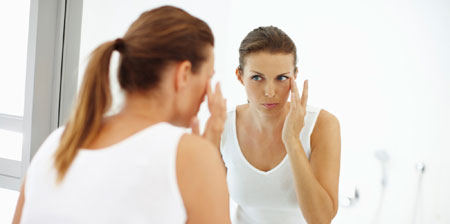Many beauty products, endorsed by some of the world's most glamorous celebrities, promise things that are simply too good to be true. These products claim to use the most advanced science involving DNA, stem cells and nanotechnology. They boast of effects such as “refueling surface skin cells” and giving skin “a dewy glow”.
許多化妝品都由名人代言,他們承諾的效果如此美妙簡直難以置信。這些產(chǎn)品聲稱使用了最先進(jìn)的技術(shù),包括DNA、干細(xì)胞還有納米技術(shù)。他們號(hào)稱可以用來“激活表皮細(xì)胞”,給肌膚“水潤光澤”。

Can we believe in all these claims? This is the question asked by a new book exploring the pseudoscience of beauty products. The book's title is “Is Gwyneth Paltrow Wrong About Everything? How the Famous Sell Us Elixirs of Health, Beauty, and Happiness”.
我們可以相信所有這些承諾么?這個(gè)問題是一本旨在探索化妝品偽科學(xué)的新書提出來的。書的名字叫做《格溫妮絲•帕特洛是不是完全錯(cuò)了?名人是如何將健康、美麗及幸福的萬能藥兜售給我們的》。
The author, Timothy Caulfield, is a professor of law and public health at the University of Alberta in Canada. He spent the past few years looking at scientific literature and testing out celebrity health and beauty tips, reported vox.com. Some of these tips are simply pseudoscience, such as detoxing by only drinking juice and keeping fit by only choosing organic food.
書籍作者蒂莫西•考菲爾德是加拿大阿爾伯塔大學(xué)法律與公共衛(wèi)生系教授。據(jù)綜合類網(wǎng)站vox.com報(bào)道,他過去幾年花時(shí)間研究了科學(xué)文獻(xiàn),并對(duì)名人給出的健康和美麗秘訣進(jìn)行了檢驗(yàn)。結(jié)果證明,其中的一些建議完全是偽科學(xué),比如說只喝果汁可以排毒,只選擇有機(jī)食物就可保持健康。
“Publishers don't generally sell magazines by reminding readers that nothing works,” writes Caulfield. “Consequently, getting straight answers about anti-aging and beauty products is nearly impossible.”
考菲爾德寫道:“出版商如果告訴讀者什么都不管用,一般也賣不出雜志。因此,這些關(guān)于化妝品的廣告和建議一般不對(duì)化妝品的效果給出明確的答案,而是使用一些模糊詞匯。”
He concludes that phrases such as “clinically proven” or “dermatologist approved” are as vague as they are evasive.
他的結(jié)論是,那些聲稱化妝品經(jīng)過了“臨床驗(yàn)證”或者“皮膚科專家認(rèn)可”的遣詞用語既混淆視聽又逃避事實(shí)。
Research void
研究空缺
“For example, what kind of study led to the representation that a given product was clinically proven?” he asks. “Did the manufacturers simply ask a couple of buyers? Do not be fooled by this kind of language.”
他問道:“比如說,什么樣的研究可以得出某項(xiàng)產(chǎn)品是經(jīng)過臨床驗(yàn)證的?難道是制造商隨便問問幾個(gè)買家就可以?不要被這些用詞給騙了。”
“In addition, little literature produced by independent researchers is out there. For many beauty products, there seem to be either no data or only small studies produced by proponents of the product.”
“除此之外,市面上甚少有第三方研究人員做出的研究成果。許多化妝品都是要么沒有數(shù)據(jù)支撐,要么就是由產(chǎn)品的一些擁躉提供小范圍調(diào)研。”
To some degree, this is understandable, says Caulfield: “Government research entities have little interest in funding big studies on the efficacy of, for instance, the bird-poop face cream used by David and Victoria Beckham. So there isn't a lot of good science to draw on.”
考菲爾德認(rèn)為,某種程度上來說,這是可以理解的:“政府研究部門幾乎沒有興趣資助大型研究去試驗(yàn)大衛(wèi)貝克漢姆和維多利亞貝克漢姆用的鳥屎洗面奶效果怎么樣。因此,沒有什么正經(jīng)科學(xué)可以用來考證。”
To make matters worse, says Caulfield, mass media are rarely critical of new beauty products. The vast majority of articles simply trumpet their alleged value, using vague phrases such as “feel revitalized” and “appear radiant”. It's difficult to find any evidence or expertise beyond personal testimonies. The so-called experts who are quoted in these stories are often part of the beauty industry or individuals with no research background.
考菲爾德稱,更糟糕的是,大眾媒體很少去評(píng)判新型化妝品。大多文章都只是吹噓他們所謂的功效,使用一些似是而非的詞匯如“煥發(fā)新生”和“光彩照人”等。除了普通人提供的證明之外,很難找到任何其他證據(jù)或者專業(yè)解答。這些故事里引用的所謂專家都是美容業(yè)的一份子,或者是沒有任何科研背景的個(gè)人。
An article from Pacific Standard magazine also points out terms such as “clinically proven” or “dermatologist recommended” have no industry standard definition. And since most manufacturers aggressively guard their products with patents or laws that protect trade secrets, consumers have no way of knowing what is actually in the products or how they were tested.
科學(xué)期刊《太平洋標(biāo)準(zhǔn)》中的一篇文章同樣指出,諸如“臨床驗(yàn)證”或者“皮膚科專家認(rèn)可”這類術(shù)語沒有產(chǎn)業(yè)標(biāo)準(zhǔn)認(rèn)證。它們還用專利法規(guī)和其他保護(hù)商業(yè)機(jī)密的法律來保護(hù)他們的產(chǎn)品,因此消費(fèi)者根本無法知道產(chǎn)品真正成分,也不知道它們是怎樣經(jīng)過檢驗(yàn)的。












